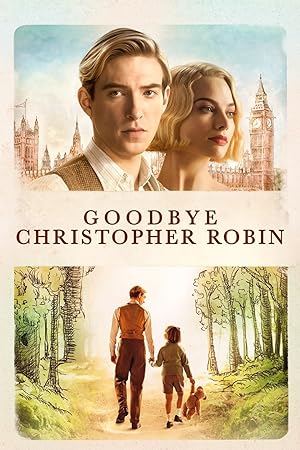Goodbye Christopher Robin had a marketing problem. Even though they are all incredibly different, during the fall of 2017, there were a glut of movies about historical figures (Breathe, Professor Marston and the Wonder Women), especially authors such as Rebel in the Rye and The Man Who Invented Christmas. It was easy to confuse them, and even people who wanted to see one of these movies easily confused them with the others and thought the movie was already released, when it was not. All these movies had incredibly short runs in theaters disproportionate to the actual interest in the subject matter and the quality of production, especially the cast. This concentration had the effect of making it easy to decide to see all of them eventually once they were available on DVD, and even then, without a sense of urgency, competition and anticipation of a mad rush to get the DVD first. These are all movies that in the past sound like Oscar nominees, but somehow are relegated to the middling to fair rating. Other than Professor Marston and the Wonder Woman, I relegated these films as safe to watch with my mom.
Goodbye Christopher Robin is marketed as a fairly standard biopic on the creation of Winnie the Pooh perfectly suited for families. Even though it should be obvious from the title, it is about trauma with only a brief respite of joy and wonder in the middle. While the story is audacious, it is a visually conflicted movie that prefers the safeness and appeal of shooting in fairly standard ways with golden light bathing the idyllic English countryside. Only the opening scenes slip through various time periods to reflect the psychological perspective of someone suffering from PTSD to reflect that even though one can be perfectly safe, a person can feel plunged into a dangerous scenario.
Goodbye Christopher Robin wants that Winnie the Pooh audience, but it would have been better served to be more upfront about the subject matter so it could attract the kind of audience that would appreciate it, and not attract a crowd unprepared for how bleak it was going to be then warn others to not see it. By only alternating between A. A. Milne, the author of Winnie the Pooh nicknamed Blue, and his son as the main characters, the movie missed an opportunity to be stronger and rely on the collective strength of the entire cast as an ensemble to attract viewers. Instead the movie primarily rests on the star power of Domhnall Gleason, who is an extremely gifted actor with an undeniably stellar resume and delivers a solid performance, but no one on this side of the pond knows how to spell his first name without the aid of Google or IMDb. It also depends on Will Tilston’s appeal. His performance as Blue’s son, the titular character better known as Billy Moon, is perfect, but he is a kid, and this movie is his first job so no one other than his family is going to see this movie based on his star power or talent. The movie should have expanded Margot Robbie’s role as Daphne, the marketing matriarch of the Milne clan, especially since she delivers an unflinching performance and embraces her character’s worst qualities. Boardwalk Empire’s Kelly Macdonald, who plays the nanny, Olive, should have been featured more in the promotional material.
Goodbye Christopher Robin reminded me of Jean Paul Sartre’s No Exit in which every one is alone in a private, personal hell, and I actually liked the audaciousness of the script. Everyone can be well intentioned and still hurt others. Blue’s war induced trauma leads to his wife’s accidental physical and psychological trauma that results in unintentional child labor, exploitation and abuse. Each finds different forms of joy from the same source, but that source also creates unforeseen negative side effects of disillusionment and alienation from affection. It is not an uplifting movie for children. It is about a group of emotionally stunted people that clearly love each other and can barely convey it. There is a conflict of expectations and reality. Only the nanny is psychologically healthy.
Goodbye Christopher Robin contains an important lesson for viewers. If you are at your happiest acting contrary to society’s expectations, embrace it. Daphne clearly had a head for business, but staunchly enforced gender norms that would repeatedly hurt her. Blue was surprised that he loved being with his son and raising him, but sends him to boarding school. Even Billy Moon likes to sabotage himself! Other than war, they are the cause of their own unhappiness and destroy what they love.
I’m not sure whether or not sufferers of PTSD will like the movie and am curious as to how they received the film. Even though Goodbye Christopher Robin is based on real life characters, other movies such as Iron Man 3 love the trope of children as the cure to psychological trauma. While I’m sure that there is some kernel of truth to this trope, it is equally likely that children of PTSD sufferers may heartily disagree with it. The movie also recognizes how fleeting this solution is, but still suggests that because this malady stems from imagination, only another person who understands the importance of make believe and treats it with the same gravity as reality can reach someone trapped in their mind.
If you are looking for a feel good movie, keep walking, but if you are looking for a flawed biopic with a talented cast about Winnie the Pooh’s creator, then definitely give it a chance. My mom was completely confused by the beginning and never found her footing.
Stay In The Know
Join my mailing list to get updates about recent reviews, upcoming speaking engagements, and film news.





